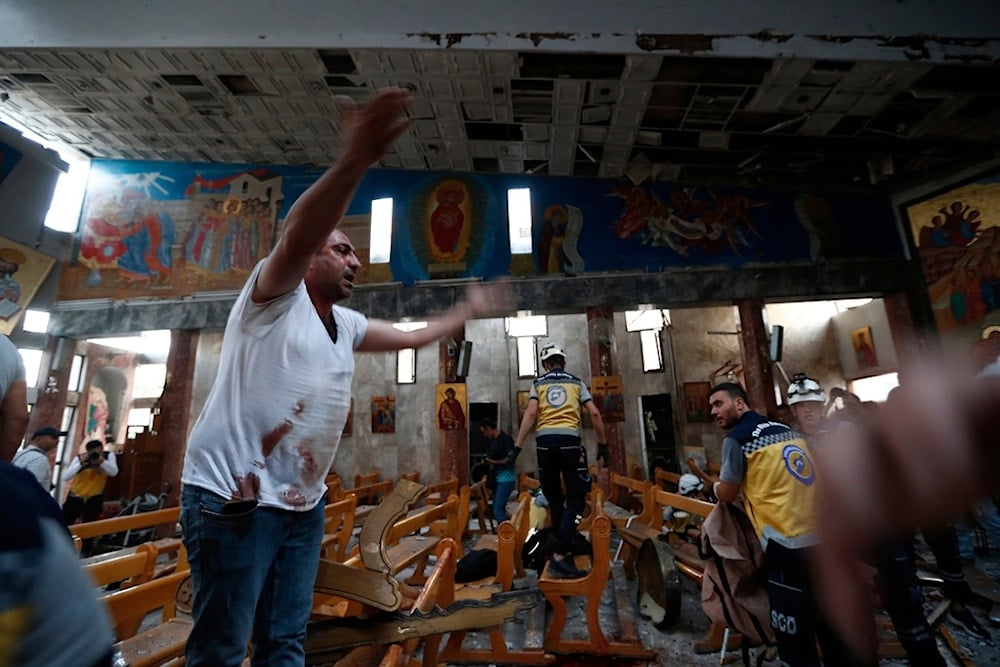Hezbollah condemns Damascus church terrorist bombing
Hezbollah condemns the terrorist attack on Mar Elias Church in Damascus, blaming takfiri ideology and foreign-backed plots to divide Syria and incite sectarianism.
-

A Syrian man reacts inside Mar Elias church where a suicide bomber detonated himself in al-Dweila on the outskirts of Damascus, Syria, Sunday, June 22, 2025. (AP)
Hezbollah strongly condemned the terrorist bombing that targeted the Mar Elias Church in the al-Dweila neighborhood east of the Syrian capital Damascus, which resulted in the death and injury of several civilians.
In a statement issued on Sunday, Hezbollah described the attack as a “heinous crime” that once again reflects the brutality of extremist takfiri ideology. The movement emphasized that such acts have no connection to any divine religion and represent “a satanic creation backed by the American-Zionist axis,” activated whenever there is a need to sow discord and fragment regional nations.
“This criminal bombing underscores the ongoing threat posed by extremist groups that aim to destabilize and divide,” the statement read, blaming malicious forces for using terrorism to serve geopolitical agendas.
Hezbollah affirmed that these crimes would not succeed in breaking the unity of the Syrian people. The movement expressed full solidarity with Syria and its diverse social fabric, voicing confidence that Syria would reject these extremist groups, which do not represent the country's national identity or values.
ISIS claims responsibility
ISIS on Sunday claimed responsibility for a suicide bombing that targeted the Mar Elias Church in the Duweila district of Damascus, killing at least 20 worshippers during Sunday mass. The group's statement, shared via affiliated media channels, said the attacker detonated an explosive vest inside the church while congregants were gathered in prayer.
According to eyewitnesses cited by RIA Novosti, the bombing was a deliberate attack on civilians: "A terrorist detonated an explosive device at a church in Dweila during a service. Some people were killed." Syrian state media confirmed the attack, with Syria TV reporting that the explosion occurred inside the church during the liturgy.
Photos published by SANA in the hours following the attack reveal a scene of devastation, scorched walls, shattered pews, and bloodied floors. Emergency services cordoned off the area as security forces launched an investigation into how the assailant managed to penetrate the church's defenses.
Period of sectarian tensions
The bombing comes amid heightened instability in Syria, where a fragile transitional government led by interim President Ahmad al‑Sharaa faces growing scrutiny. Although al‑Sharaa has condemned the attack and ordered an inquiry, his past leadership of Hay'at Tahrir al‑Sham (HTS), a group previously aligned with al-Qaeda, has deepened concerns about his government's commitment to protecting minority communities.
Sectarian attacks, particularly against Christians and Alawites, have surged in recent months. In March, over 1,300 civilians were killed in coordinated assaults linked to factions loosely aligned with the transitional administration. International observers have criticized the government's response as opaque and inadequate.
Read more: Islamic State eyes resurgence in Syria, Iraq, exploiting divisions
Meanwhile, Western governments have begun easing sanctions against Damascus. The US suspended enforcement of the Caesar Act for six months, and the EU followed suit, citing humanitarian needs. Critics argue the move could inadvertently legitimize a leadership still struggling to sever ties with extremist networks and protect its own population.

 3 Min Read
3 Min Read








